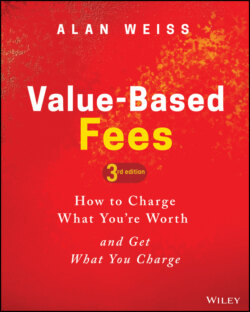Читать книгу Value-Based Fees - Alan Weiss - Страница 31
Attorneys
ОглавлениеLawyers have finally understood that their ultimate worth is not in their activity but in their results. Therefore, contingency fees have begun to proliferate. It's not uncommon for a law firm to take 30 percent or 40 percent (or even more in some conditions) of the total client settlement.
The problem is that the attorneys often take this, as they say at the craps tables in Las Vegas, as “betting on the come.” This means that if they lose the case, they not only fail to collect any fee but are also out their legitimate legal expenses. This is high-stakes gambling, and it leads to at least four ethical quandaries:
1 Pushing the case beyond the plaintiff's patience or commitment, because, in for a dime in for a dollar, it's cheaper to invest more on the hope of a possible victory than to simply abandon all prior investment
2 Avoiding early settlements in the hope of hitting the jackpot of a huge jury decision or a more favorable last-minute settlement in the face of a damaging trial
3 Taking on cases of questionable legal merit or suing parties not really at fault but who have deep pockets and wealthy insurers
4 Desperate legal tactics to try to save a case at the last minute
Most contingency cases are settled out of court to reduce expenses, and most personal injury lawyers won't touch a case they don't think is a sure thing. However, the American justice system, based on the English Common Law8 was never envisioned to have the lawyers as involved in the cases as plaintiffs, which they are when the share in the proceeds.
There isn't one profession using time units or percentages as billing bases that can match the potential fees of consultant using value-based frees. Not one.
Attorneys are locked into a terrible billing system that does not represent their true value to their clients (which is why they wind up billing $8.40 for duplicating and postage, so desperate are they to recoup costs).
Even on a more modest basis, effective and legally tight wills, estates, divorces, house closings, partnership agreements, and the myriad of other business aspects that lawyers undertake are worth a great deal to the beneficiary of such expertise. How much? Well, far more than a couple of hundred dollars an hour, that's for sure.
In one class-action lawsuit against a Fortune 500 company for some kind of minor technical charges, the lawyers collected millions in fees, and each member of the class action suit received $2.85.
The Chief Justice of the Supreme Court of Western Australia, having read the first editions of this book, wrote to tell me that he thought it was inevitable that the legal profession would have to turn to value-based fees. That was a decade ago.
